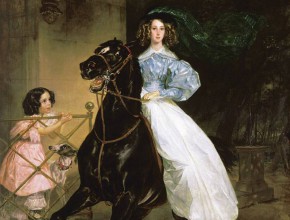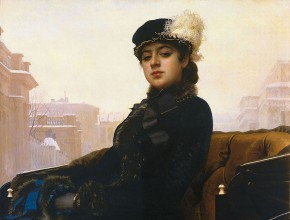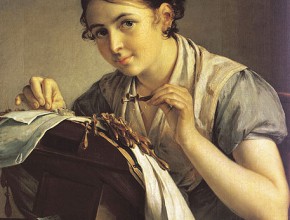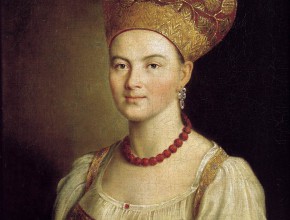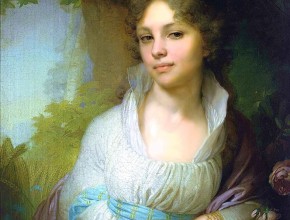A madonna for no man’s taking
It was the production of Eugene Onegin by ENO in 2011 that brought me to a curious realisation that a Russian heroine performed by a non-Russian actress/singer often appears nothing short of hysterical. I fully understand the desire of any performer to reveal what is often called “the Russian passion”, but without deep understanding of where this passion comes from, the effort remains superficial and therefore futile.
There is a lot to be said about the role of a woman in Russian cultural context. Hardly anything can be compared to the strength, resilience and ability for self-sacrifice of a Russian heroine. Historically and culturally women have always been the spiritual spine of the Russian nation and ensured its survival.
It is not surprising, therefore, that an image of an ultimate Russian heroine has traveled across Russian literature, art and music and gained an extraordinary power over the hearts and minds all over the world. From Dostoevsky’s Nastasia Philipovna to Pushkin’s Tatiana, from Rimsky-Korsakov’s Ljubasha to Tolstoy’s Anna Karenina, from Shostakovich’s Katerina to Bulgakov’s Margarita, she changes epochs and attires but remains unchanged in the core. So what makes her so special and enigmatic, easily recognisable from piece to piece, from author to author?
The strength
Nikolaj Nekrasov summarised it in a few lines of his poem “Father Frost” (1863):
At play a horseman will not catch her,
In need she will save the whole world,
She will stop a stallion in a mad run,
She will walk into a burning house…
The sources of her strength and resilience seems to be hidden in nature itself. She is a true daughter of the earth on which she stands, she is one of the elements herself – unstoppable and overwhelming as the elements tend to be. From Rachmaninov’s songs to Tchaikovsky’s operas, Russian music never portraits her as sentimental, but always dignified, facing a tragedy with honour and the assurance that she has to keep upright. Who else, if not her?
The longing
In a sad parody to the verse above another Russian poet Naum Korzhavin wrote in 1960:
In fact she hoped for something different,
Like a white bride’s gown.
But the stallions keep running,
And the houses keep burning…
Her power is unmatchable and she probably knows it. But it doesn’t defeat her hope to allow herself once in a while to be supported, to be weak, to be cherished. She rarely shows it openly. You can sense her longing only indirectly in the occasional careless phrases, in desperate uncontainable cries or in whisper. “None, none will come!” – sings Katerina in “Lady Macbeth of Mzensk”. “Imagine, I am on my own here, nobody can understand me.” – reluctantly reveals Tatiana in her letter. “I am worn out with grief, day and night – all just about him.” – confesses Liza in “The Queen of Spades”. Mind you, most of these confessions are just soliloquies, heard by the audience but not by the heroine’s surroundings, and, consequently, they are hopelessly unsolvable.
The sacrifice
It’s all or nothing for her. An object of her adoration rarely deserves her and is sure to break her heart, but this knowledge is to no avail. Pushkin genially noted: “The less we love a woman the easier we are loved by her”. Self-sacrifice is vital to her self-realisation, because despite of her strength and dignity, despite of her high abilities and remarkable beauty, she doesn’t see her existence worthy unless she is a part of a higher spiritual plan. Yet, she is no fool. If her sacrifice is unappreciated she can turn to a rage of the same power as is her devotion, as does Marfa in Khovanshcina or Ljubasha in The Tsar’s Bride. However, the final blow she will always direct at herself – not a single Russian heroine lives happily ever after.
The love
Love is the ultimate and often the only purpose of her life and this is precisely what makes her sacrifice so easy – there is nothing beyond love anyway. Love descends upon her as a spiritual mission, as God’s will for which alone she is designed. Tatiana only sees Onegin once, Liza hardly knows Hermann, Natasha doesn’t understand and is fearful of Bolkonsky, but the depth of their feelings is full and uncompromised. Love is her only fate and the only deity she serves. It is love that gives her strength to endure any pain. It is love she is longing for. It is love that calls her to sacrifice every bit of her being. It is her fate and her purpose.
Operas:
Tchaikovsky “The Queen of Spades”
Rimsky-Korsakov “The Tsar’s Bride”
Shostakovich “Ledy Macbeth of Mzensk”
Categories: Blog post

